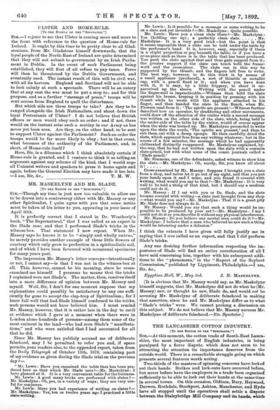THE LANCASHIRE COTTON INDUSTRY.
1 To TUE EDITOR or ras "arscrAres."1 SIR,—At this moment, the cotton trade of South-East Lanca- shire, the most important of English industries, is being. paralysed by a fierce dispute, which does not seem to be. attracting the attention its importance deserves from the outside world. There is a remarkable struggle going on which presents several features worth noting.
Two-thirds of the masters of spinning concerns have locked out their hands. Strikes and lock-outs have occurred before,. but never before have the employers in a trade been organised sufficiently to be able to lock out their bands at the same time in several towns. On this occasion, Oldham, Bury, Heywood, Darwen, Rochdale, Stockport, Ashton, Manchester, and Hyde have all stopped until the operatives shall settle a dispute between the Staleybridge Mill Company and its hands, whiols
has been hanging over for more than six months. This dis- pute would appear somewhat trivial : the operatives refused to work until they had been paid a sum of £28. But rather than pay that 228, the Staleybridge Masters' Association have paid to the Staleybridge Company compensation for bearing the brunt of the fight at the rate of £7,520 per annum. It is not the amount of the claim, but its justice, that the owners refuse to allow.
Since the lock-out began, now a fortnight ago, this dispute would have been settled but for the introduction of a new problem the solution of which is more important to both sides than the original question.
When the Union operatives left their work at the Staley- bridge Mill, the Company worked to the best of their power with hands who did not belong to the Union. If the original question in dispute is settled by arbitration, or otherwise, are the Union hands who left their work to be taken on again, and the non-Union hands who have taken their places dis- charged, or not ? The Union says that all Union hands must be taken back, whether the award is given in their favour or not. The masters say they will only take back their old hands as they have room, and will not discharge the non-Union hands who have helped them in their difficulties. This is a question that it is impossible to put to arbitration. It will have to be fought out to the bitter end, and it will take months to starve the operatives into submission. If the masters lose, it means for them that the Union officials appoint their hands. And if the Union appoints his bands, how will a master maintain his discipline ? It has been increasingly difficult for years to do 80 ; but if he is beaten this time, he might as well send his keys to the Union first thing. If the operatives lose, it will appear to them that the Union has lost its power, since it cannot reinstate in work those whom it has supported in striking. To destroy their faith in the Union, which has hitherto been infallible, will be almost like undermining their religious belief ; they will feel themselves lost. —I am, Sir, &c.,
F. B.







































 Previous page
Previous page